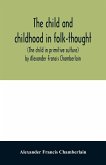In reading this book on Child Psychotherapy, the reader must take into consideration the influences attributed to childhood. Childhood is after all a very influential phase in the human life-cycle, which stretches roughly from infancy to puberty or to the legal age of majority. Because children can be distinguished from adults by certain biological and cognitive characteristics, childhood is perceived as separate from adulthood, and the transition is normally accompanied by a significant change in social and legal status and marked by rites of passage and initiation. The social significance, experience, and duration of childhood are extremely variable, both historically and geographically. For example, before the 20th century, children in Europe generally worked alongside their extended family in factory, field, or mine. In many developing countries, children still work alongside their parents, marry and have children at an age when their coevals elsewhere are required to remain in school.
Hinweis: Dieser Artikel kann nur an eine deutsche Lieferadresse ausgeliefert werden.
Hinweis: Dieser Artikel kann nur an eine deutsche Lieferadresse ausgeliefert werden.









